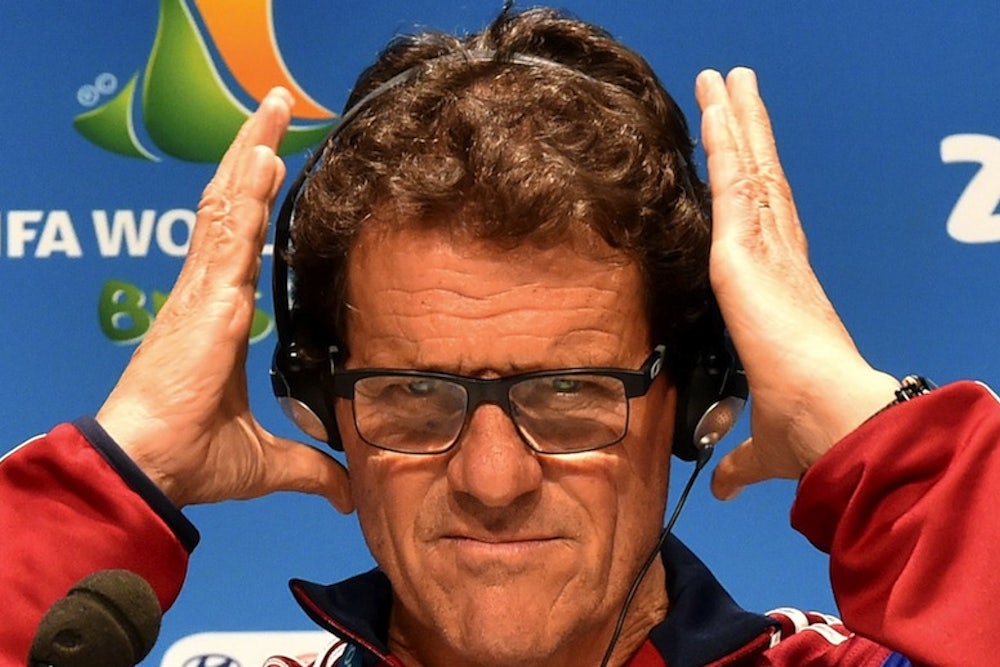The Russian team has been nearly done for days, though this afternoon they will be playing their parting match against Algeria. If they lose, they're out. They’ve played limply, without the nationalistic fire in their belly that all the rest of their countrymen seem to have caught. Their lackluster performance, however, is a feat in and of itself: it is a miracle that they were in this World Cup at all. The Russian national team didn’t qualify in 2006 or 2010. Had they failed to qualify this time, would’ve been out of the international swing of things for 16 years by the time the World Cup rolled into Russia in 2018.
For the pleasure of showing up, the Russians have paid an incredible price: 9 million Euros per year ($12 million), starting in 2012, until at least 2018, paid to their star Italian coach, Fabio Capello. That makes Capello the highest paid coach at the World Cup, by far. England’s Roy Hodgson was the next highest-paid coach, but he brings in less than half of what Capello does. Everyone else coaching at the Cup lags far, far behind him: the average coach at this tournament makes just $2 million.
Fat lot of good shelling out the big bucks did for Russia and England (which, by the way, Capello coached before taking over Russia’s team), but the way Russia did it was just…so Russian.
Going into this Cup, the talk in Russia was that this team actually had a chance: they’d had foreign coaches for the last decade! And, for all of Russia’s nationalistic fervor, there is still a not-so-hidden preference for the goods imported from Europe, be they fine leather shoes or soccer coaches.
When the Russian Football Union decided to start hiring foreign coaches, they started with Guus Hiddink, in 2006, and then moved on to Dick Advokaat, in 2010. Each of those men was paid millions of Euros a year, but not by the Russian Football Union, which, ironically, is rarely financially solvent. (This winter, it declared it was in the red by $18.) Nor were their salaries paid for by sponsorships and ad revenues, like they are in other parts of the world.
Like many things in Putin’s Russia, these pricey, shiny European coaches were paid for by businessmen pressed into service by the Kremlin. Hiddink’s salary was rumored to have been paid for by Gazprom (majority owned by the Kremlin), and Advokaat was openly paid for by Roman Abramovich, owner of Chelsea.
This is much the same way that Putin paid for the Sochi Olympics: kindly asking his oligarchs to foot a large chunk of the bill. “It’s forced charity,” says Nikita Belogolovcev, a Russian sports journalist.
With Capello, though, no one quite knows who’s paying for it. There are rumors that he is being paid for by three Russian oligarchs, all chipping in to keep the miracle-working Italian working for Moscow, who has now committed to work until 2018 to get the Russian team into shape for their domestic World Cup. One of Capello’s patrons is rumored to be billionaire Leonid Fedun, part owner of LukOil and the owner of Russia’s Spartak football club. The second is the shady financier Suleyman Kerimov, who owns Dagestan’s Anzhi club. The third is the even shadier Uzbek mining mogul Alisher Usmanov, who also owns 30 percent of British club Arsenal.
Capello, for his part, is perfectly playing the part of the exemplary foreigner in the north. Unlike his two Dutch predecessors, he lives in Moscow and is frequently spotted at the Bolshoi because, of course, he’s an opera buff. He also, of course, has a tremendous art collection and dresses every bit the suave Italian, a stereotype Russians swoon for, male or female.
It’s all a very Russian story: ungodly amounts of money spent with little to show for it. In the meantime, the foreigner makes off like a thief. Sure, he helps the local team improve a bit, maybe makes their soccer a bit boring—Capello was reportedly fired from Real Madrid because he made them play such boring, defensive soccer. For him, it’s a glorified retirement. It’s not as embarrassing as going to coach the Qatari team, but it’s still great money. And, apparently, it wasn’t even the deciding factor for Capello, who was being paid 6 million Euros by England. This was just the Russians voluntarily sweetening the deal. It all reminds me of the classic Russian joke, in which one oligarch compliments another’s tie.
“Thanks, it’s Hermes,” he says.
“How much?” the other asks.
“$250.”
“Idiot,” says the other. “You can get it for $300 across the street.”
